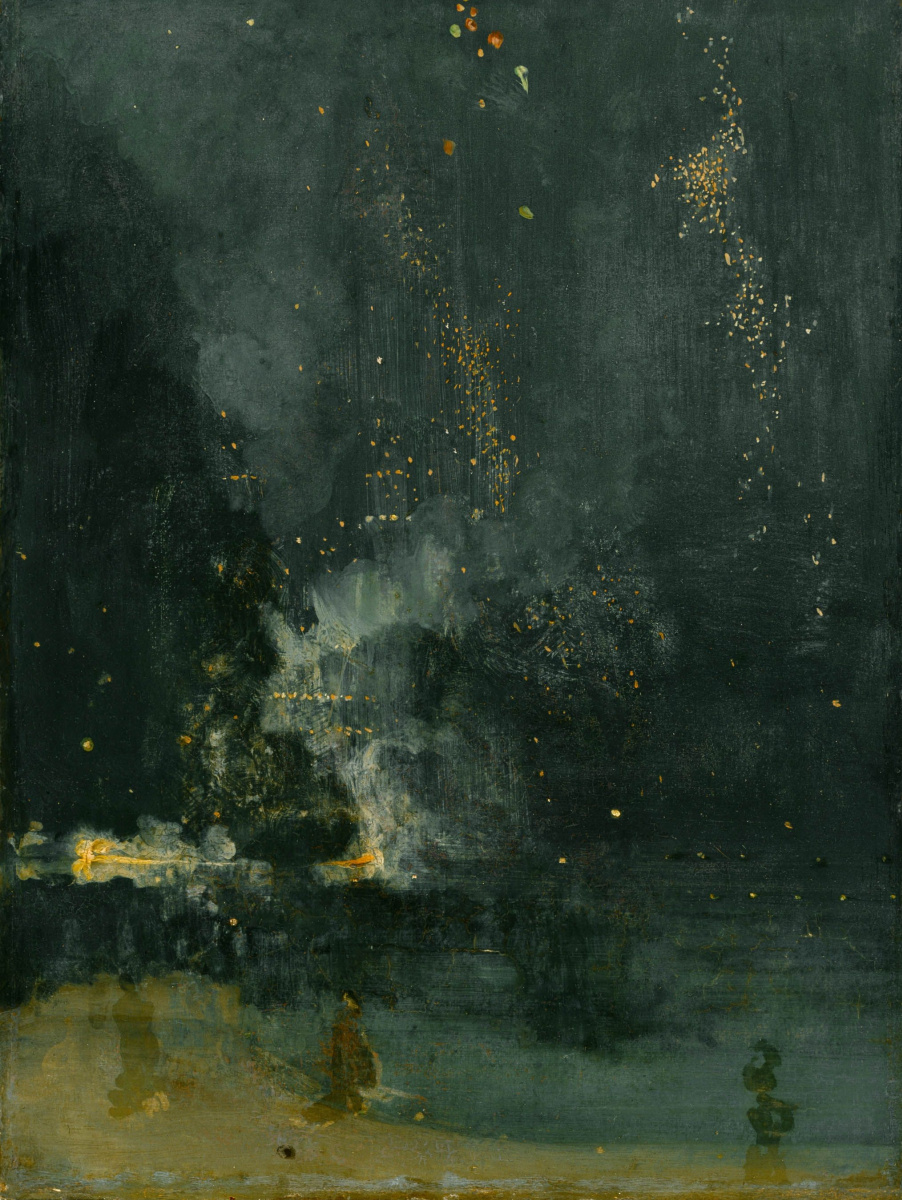log in
Enter site
Login to use Arthive functionality to the maximum
Nocturne in black and gold. The falling rocket
James Abbot McNeill Whistler • 绘画, 1875, 60.3×46.6 厘米
画作描述 «Nocturne in black and gold. The falling rocket»
In 1877 James Whistler exhibited in a London gallery, the Grosvenor picture "Nocturne in black and gold. The falling rocket".
Oily surface of the Thames. The dark sky in the yellow craters sparks. Smoke on the water, which vaguely discern the outlines of Chelsea. This is the shifting, dreamlike, designed in the ultimate dark-coloured cloth, perfectly describes the creative method of Whistler, who believed that the purpose of painting is not to capture reality, but to convey the impression of it. He wrote not night fireworks display in the Cremorne gardens, and dream about it. Memory. The feeling is elusive and transitory, like the fading trajectory of the rocket. Whistler believed that he has a right to a similar approach. Otherwise it would become a photographer, not an artist.
Of course, in 1877-m, few shared his views. Especially angered "the falling rocket" John Ruskin artist, writer, historian of art and highly respected art critic.
Ruskin was not a reactionary – he actively supported the pre-Raphaelites he opened the contemporaries William Turner. But progressive Ruskin was the border.
"I've heard a lot about shamelessness and conceit Cockney– wrote Ruskin in the London press. – But I do not think that I will be able to see how smug buffoon will require two hundred guineas for throwing a pot of paint in the face of the public".
Whistler did not want to put up with the public flogging and sued Ruskin libel suit.
When Ruskin's lawyer asked in court, how much time Whistler was working on the painting, he replied: "Two days". "And for two days you want to receive 200 guineas?!" - "No retorted Whistler, - I want to get this Board for knowledge, which extracted all my life".
Whistler hoped that the court would take his side colleagues, but few became his side – too big and menacing was the authority of Ruskin. Not even helped by the fact that the critic himself did not attend the hearing because of mental illness (in these years, Ruskin has frequent bouts of mental illness, and he almost never left the house).
The court found the John Ruskin guilty of libel: in the end, Whistler no one was poured from a pot of paint, and Cockney of him - of US-born - turned out so-so. However, instead of the required £ 1,000 Whistler received a symbolic compensation of one quarter of a penny. Court costs almost ruined James McNeill Whistler, he had to sell the property and declare bankruptcy. Later James Whistler will include memories about the lawsuit with Ruskin in his book with the eloquent title "the Delicate art of making enemies."
Author: Andrew Zimoglyadov
Oily surface of the Thames. The dark sky in the yellow craters sparks. Smoke on the water, which vaguely discern the outlines of Chelsea. This is the shifting, dreamlike, designed in the ultimate dark-coloured cloth, perfectly describes the creative method of Whistler, who believed that the purpose of painting is not to capture reality, but to convey the impression of it. He wrote not night fireworks display in the Cremorne gardens, and dream about it. Memory. The feeling is elusive and transitory, like the fading trajectory of the rocket. Whistler believed that he has a right to a similar approach. Otherwise it would become a photographer, not an artist.
Of course, in 1877-m, few shared his views. Especially angered "the falling rocket" John Ruskin artist, writer, historian of art and highly respected art critic.
Ruskin was not a reactionary – he actively supported the pre-Raphaelites he opened the contemporaries William Turner. But progressive Ruskin was the border.
"I've heard a lot about shamelessness and conceit Cockney– wrote Ruskin in the London press. – But I do not think that I will be able to see how smug buffoon will require two hundred guineas for throwing a pot of paint in the face of the public".
Whistler did not want to put up with the public flogging and sued Ruskin libel suit.
When Ruskin's lawyer asked in court, how much time Whistler was working on the painting, he replied: "Two days". "And for two days you want to receive 200 guineas?!" - "No retorted Whistler, - I want to get this Board for knowledge, which extracted all my life".
Whistler hoped that the court would take his side colleagues, but few became his side – too big and menacing was the authority of Ruskin. Not even helped by the fact that the critic himself did not attend the hearing because of mental illness (in these years, Ruskin has frequent bouts of mental illness, and he almost never left the house).
The court found the John Ruskin guilty of libel: in the end, Whistler no one was poured from a pot of paint, and Cockney of him - of US-born - turned out so-so. However, instead of the required £ 1,000 Whistler received a symbolic compensation of one quarter of a penny. Court costs almost ruined James McNeill Whistler, he had to sell the property and declare bankruptcy. Later James Whistler will include memories about the lawsuit with Ruskin in his book with the eloquent title "the Delicate art of making enemies."
Author: Andrew Zimoglyadov


